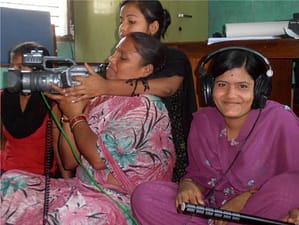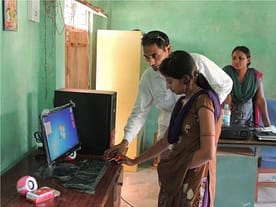A new tv programme by IWMI, NEFEJ and villagers from Dhanusha District
Background
Men and women farmers are given a limited opportunity to voice their concerns in the national debate on climate change. As a result, climate change policies and interventions hold the risk of being based upon simplistic assumptions of how rural men and women experience and address climate variability, risk and uncertainty.

To bring the concerns of these farmers to national policy arenas, the International Water Management Institute (IWMI) and the Nepal Forum of Environmental Journalists (NEFEJ) have collaborated to develop an expository TV program from a participatory video project conducted in the Dhanusha District. Participatory videos are films created by the subjects themselves, which give producers intimate control of the issues presented.
Twelve men and women farmers from two villages in the Dhanusha District, who are trained in creating and editing videos, will produce a series of short films on livelihood adaptation to climatic and societal changes.
NEFEJ will enrich the films to create 20-minute TV episodes by adding comments from local or national policymakers, government agencies, development practitioners and scientists on the issues raised by the communities. The TV episodes will be broadcast every other Monday under the “NEFEJ hour” on the Image Channel in Nepal. The first episode is set to air this Monday, July 8, 2013.
Results and expected outcomes
By creating participatory videos, men and women farmers have the opportunity to voice their views without there being a filter, step back and evaluate recent changes in their lives, and to share their experiences and ideas on agriculture, livelihood adaptation, gender and climate change. This project has two major purposes:
- Increase dialogue between Nepali farmers and policymakers, and include community experiences in our understanding of the impacts of climate change on rural livelihoods.
- Empower men and women farmers so that they may articulate their needs and raise their voices on the issues that matter to them.


Be involved
| IWMI, Nepal Office:Floriane Clement, Researcher – Institutional andPolicy Analysisf.clement@cgiar.org | NEFEJ:Sushil Mainali, Director, Audio Visual Departmentsushil_mainali@hotmail.com |
- “Women’s Voices in Nepal – Stories of Climate Change” – http://www.youtube.com/watch?v=JV2Xsub40ww
- “Participatory video training in Nepal” – http://www.youtube.com/watch?v=GUdroAm_4AE
Supported by IWMI and CCAFS




